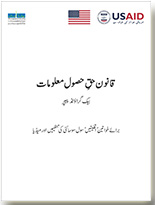This is Urdu version of “Right to Information Law: for Women, Minorities, CSOs and Media”.
Citizens’ access to public related information and services in a transparent, accountable, effective and efficient way is of paramount importance for vibrant democratic governance. This has been a challenge in Pakistan due to both legal and administrative issues as well as lack of effective utilisation of their right to information by citizens. The challenge is greater in remotely located rural and peri-urban areas both due to administrative hiccups as well as lack of awareness.
While Pakistan was the first country in South Asia to have legislated citizens’ right to information at the Federal level in 2002 with Provinces following suit with Provincial RTI laws, effective utilisation of right to information has shown mixed results. Lack of awareness both at the levels of governments on effective operationalization of the RTI laws, and at the level of citizens on effective utilisation of legal rights and provisions has meant that goals of accountability, openness and oversight of democratic governance are not fully realised.
This paper aims to fill this gap in awareness by outlining the basic principles of Right to Information as well as the specifics of the law in force in Punjab. It would serve as an introduction to the law, and the principles of its implementation for relevant officials and citizens.
The draft of the paper has been put together by Ms. Sonia Qadir, PILDAT Projects Manager, using PILDAT’s extensive work on the subject, with review by Ms. Aasiya Riaz, Joint Director, under the overall guidance and supervision of Mr. Ahmed Bilal Mehboob, President.
This paper has been published by PILDAT under its project Enhancing Empowerment of Women and Minorities of South Punjab through More Effective Use of RTI Law for which it has received financial support from USAID Small Grants Ambassadors’ Fund.
PILDAT team has made every effort to ensure accuracy of the publicly available data and analyses based on it. Any omission, or error, therefore, is not deliberate. The views, analyses and scores in this report do not necessarily represent the views of USAID Small Grants Ambassadors Fund.








